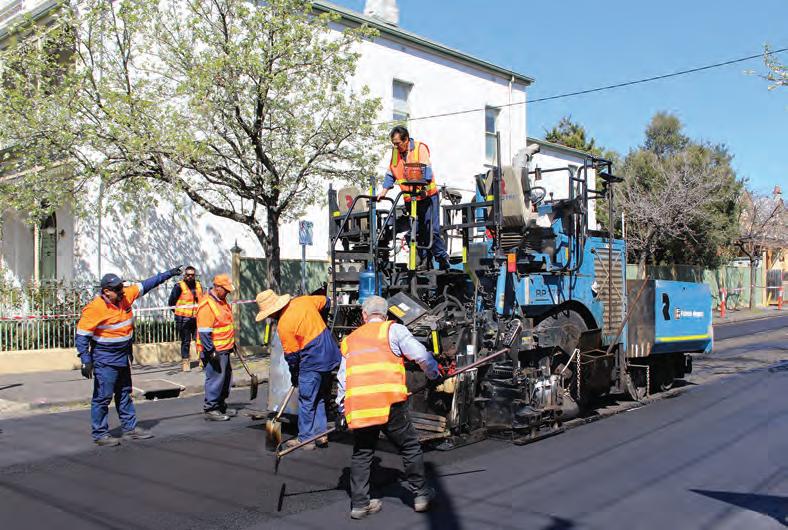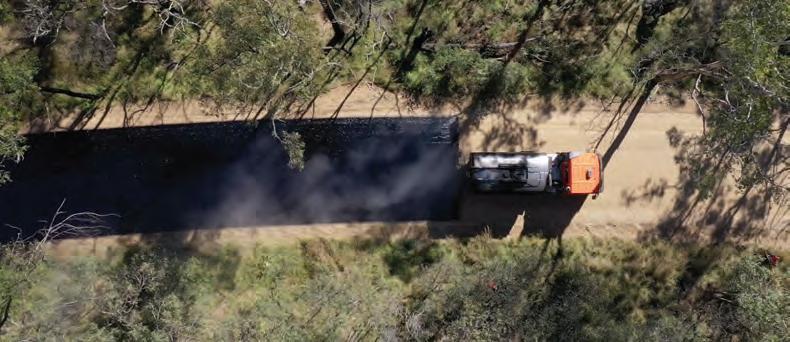
6 minute read
Roads meeting safety
ROADS MEETING SAFETY AT AFPA 2021
SYMPOSIUM
THE AUSTRALIAN FLEXIBLE PAVEMENT ASSOCIATION’S ‘ROADS GOING FULL CIRCLE’ SYMPOSIUM WAS AN OPPORTUNITY FOR KEY PLAYERS IN THE PAVEMENT INDUSTRY TO SHOWCASE THEIR LATEST RESEARCH AND TECHNOLOGIES. ROADS & INFRASTRUCTURE REPORTS.
When the Australian flexible Pavement Association (AfPA) released its Strategic Plan 20202022, health and safety were identified as key priorities in the industry peak body’s vision for the next 50 years.
So it was that the first day of the AfPA 2021 Symposium, ‘Roads Going Full Circle,’ focussed on ways to improve health and safety within the paving community. Sponsored by Viva Energy, the virtual event brought together over 250 attendees on the first day.
Matthew MacMahon, AfPA Chief Executive Officer, opened the Symposium by explaining why health and safety were strategic priorities for AfPA.
“This is the Board strategic priority I am most passionate about. Our people deserve to be healthy and safely go home after a hard day’s work. This is what keeps me up at night and I am proud to lead an association that sees this as a priority,” he said.
“The biggest safety risk areas for our industry remain: working under live traffic, working near mobile plant, burns and explosions; and the mental health of our people – in particular under these uncertain COVID times,” he added.
TALKING ABOUT MENTAL HEALTH When considering the safety and wellbeing of those working within the pavement sector, mental health is often discounted or disregarded altogether in favour of the tangible aspect of workplace safety, namely the physical health. Wayne Schwass, former AFL player and a passionate advocate for mental health and emotional wellbeing engaged the audience in an interactive session wherein he encouraged the attendees to talk about mental health candidly within their workplaces to help break the stigma around the issue.
“One of the things that I’ve consistently heard and seen from people is that there’s this misconception that we need to be clinically trained [to talk about mental health] …It’s actually not accurate. We can be everyday Australians working in the road construction industry... Every one of us has the ability and the opportunity of being able to talk about these types of topics and why they are important,” he said.
WORKERS’ HEALTH IN SPOTLIGHT Khoa Vo, Laboratory Manager at Fulton Hogan’s National Binders Laboratory presented a paper that investigates the use of sodium hypochlorite to reduce the amount of hydrogen sulphide (H2S) gas released into the atmosphere when sulphur is used as a cross-linking agent in the manufacturing process of polymer modified bitumen (PMB).
The results of these experiments have shown that sodium hypochlorite is a highly effective and economical method of reducing H2S produced in the manufacturing of PMB. It was also shown that traditional methods of negating odour in PMB plants were completely ineffective at stopping actual H2S from being released into the atmosphere.
This, as Vo pointed out, should be an issue that PMB plants take into account as the uncontrolled and unmonitored release of H2S gas can have a significant effect on the health and safety of those within close proximity of PMB plants and also may significantly impact the environment.
Ben Franze, a Materials Engineer with Fulton Hogan, explained why automated asphalt testing for the determination of asphalt bitumen content is a safer alternative to the AS/NZS 2891.3 methods currently used in day-to-day asphalt plants. A putative advantage of automated asphalt testing machines, he argued, is the reduced need for direct operator involvement, which has the potential to minimise operator exposure to hazards associated with currently used methods. A comparison of automated asphalt test machine with an existing test method by the team at Fulton Hogan had concluded that the automatic method reduced the duration of manual handling tasks by 30 to 45 minutes for every test.
Wayne Schwass, former AFL player and a passionate advocate for mental health, engaged the audience in an interactive session.
As an exhibitor on the day, Fulton Hogan showcased its FibreDec heavy duty fibre-reinforced emulsion seal for the rehabilitation and control of reflective cracking in pavements. Fulton Hogan also introduced its PlastiPhalt, an innovative, environmentally-friendly asphalt pavement containing recycled waste plastic. Unlike other asphalts modified with recycled plastics, PlastiPhalt uses specially selected polymers which are fully incorporated into the binder to make a true PMB.

INDUSTRY INITIATIVES Initiatives being undertaken by the industry to facilitate safer paving within Australia were discussed at a session led by Norbert Michel, AfPA’s Executive Director for Victoria and Tasmania. Michel offered a snapshot of the joint safety initiative conducted by Department of Transport (DoT) Victoria and AfPA for sprayed sealing operations. Now at the end of its fourth year, the joint project focusses on forward moving aggregate spreading operations.
Nicholas Lee, a Senior Pavement Technology Engineer at VicRoads shared results from a recent major trial involving significant collaboration between DoT, The Australian Road Research Board (ARRB) and industry partners with support from AfPA. The trial involved the development and placement of four industry developed crumb rubber asphalt mixes over a 1.4-kilometre length on East Boundary Road, East Bentleigh, Melbourne. Construction finished in March 2020 and the mixes will be monitored over a two-year period. A final report will be published in 2022. The trial is aimed at increasing sustainable outcomes by further developing crumbed rubber asphalts (CRA) resurfacing mixes in Victoria.
Elimination of cutters in spray sealing applications was another topic on the agenda, with Trevor Distin, Technical Marketing Manager at Colas Australia, talking about preservation of scarce resources by surfacing gravel roads with modified graded seals.
Graded seals were first used in Otta, Norway in the 1960’s where alluvial glacial gravel was used in combination with a soft bitumen to surface roads. Colas has made several improvements to these original Otta seals to provide a longer lasting and more robust surfacing. These improvements include using crumb rubber modified cutback binder and a no fines precoated graded crushed aggregate. These modifications have led to a seal which can tolerate imperfections in the base course preparation more so than conventional single sized seals.
Colas Australia and its subsidiary SAMI Bitumen Technologies were present at the virtual expo, showcasing a range of products and successful case studies. Among these, SAMI’s Stephen Bernard presented how SAMI’s low viscosity S45R product is enabling crumbed rubber modified bitumen to be sprayed without any cutter, with considerable environmental benefits.

MOVING WITH THE TIME Concluding the Health and Safety stream of the AfPA 2021 Symposium, Justin Ganschow, Business Development Manager for Caterpillar Safety Services, talked about how Caterpillar is teaching workers how to avoid danger by immersing them into a safe and controlled environment with Virtual Reality.
When using Cat Safety VR, learners wear a VR headset that fully immerses them into a jobsite. In the experience, learners engage with the foreman on the jobsite and follow specific prompts to study and respond to industry-relevant risks. Using the technology, the Caterpillar team is teaching employees to safely follow work procedures and recognise unsafe behaviours without putting them in danger.
Fulton Hogan’s innovative PlastiPhalt asphalt pavement contains shredded plastic and has already been laid on several council roads.
*This article is part of a series of articles covering the discussions from AfPA’s 2021 Symposium. The next article will focus on sustainability solutions within the paving industry.
Colas surfaced a gravel road for NSW’s Glen Innes Council with modified graded seal.










